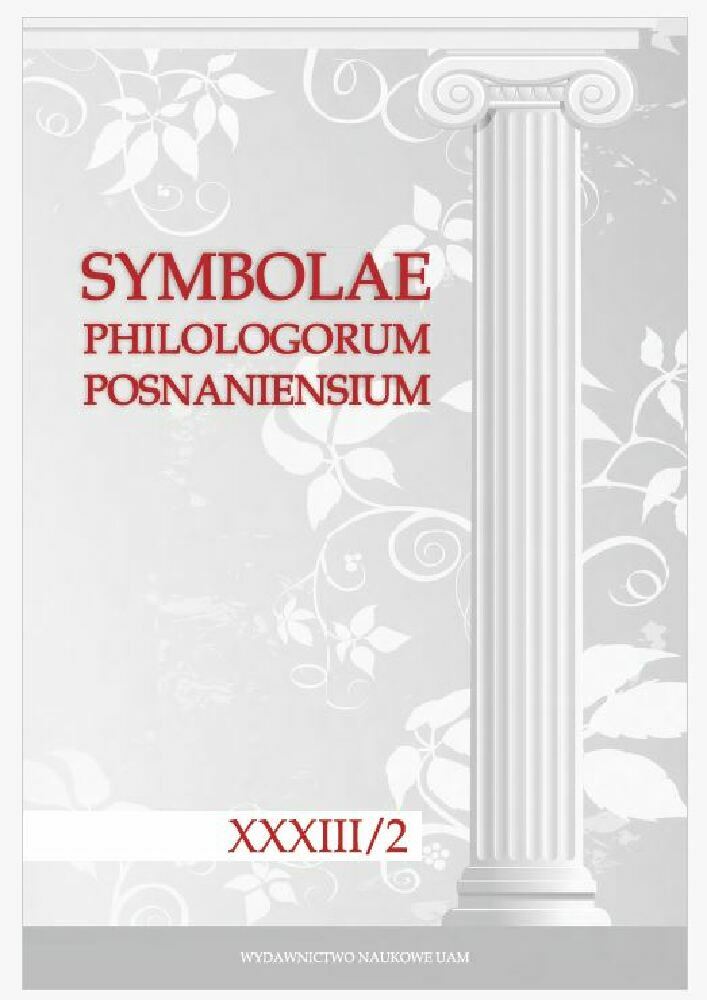Abstrakt
The study concerns one recurrent type of conversational joke in Plautus, which consists of three different steps: (1) some problematic formulation by the joke-teller, (2) a request for an explanation by the interlocutor, and (3) a punchline. Using methods of Conversation Analysis, I interpret the routine as a case of a self-repair sequence and examine responses it triggers in all the comedies by Plautus. According to the quantitative part of the study, in half of the cases, humour is not acknowledged by the in-play recipient of the joke who may understand it literally or ignore it whatsoever. In the rest of the examples the joker’s interlocutor mostly reacts negatively (with some form of verbal aggression or complaint) or continues the non-serious mode of talking by launching another joke. Ultimately, the jocular routine is associated with the figure of rebellious slave, who uses the powerful joker’s position to tease and abuse the rules of a collaborative conversation.
Finansowanie
The paper is a part of the research project ‘Conversation Analysis in Roman comedy. Pragmatics, prosody, and performance,’ financed by Polish National Science Centre (NCN) – SONATA 17 (2021/43/D/HS2/03113).
Bibliografia
Barsby 2001: J. Barsby, Terence. Comedies. Vol. 1–2, Cambridge 2001.
Barsby 1999: J. Barsby, Eunuchus. Cambridge 1999.
Christenson 2020: D. Christenson, Plautus. Pseudolus, Cambridge 2020.
de Melo 2011–13: W. D.C. de Melo, Plautus. Comedies. Vol. I–V. Cambridge 2011–2013.
Maclennan Stockert 2016: K. Maclennan, W. Stockert, Plautus: Aulularia, Liverpool 2016. DOI: https://doi.org/10.2307/j.ctv160bt7j
Walker 2005: J. Walker, A Commentary on Plautus ‘Aulularia’, PhD dissertation by the University of St. Andrews 2005.
Attardo 2020: S. Attardo, The Linguistics of Humor: An Introduction, Oxford 2020. DOI: https://doi.org/10.1093/oso/9780198791270.001.0001
Barrios-Lech 2014: P. Barrios-Lech, ‘Quid ais’ and female speech in Roman comedy, “Hermes” 142.4 (2014), 480–486. DOI: https://doi.org/10.25162/hermes-2014-0031
Beard 2014: M. Beard, Laughter in ancient Rome: On joking, tickling, and cracking up, Berkeley–Los Angeles–London 2014.
Berger 2018: Ł. Berger, Negotiating the interactional meaning on the Roman stage: Tokens of phaticity, in: Current perspectives in semiotics. Text, genres, and representations, eds. A. Gałkowski, M. Kopytowska, Berlin 2018, 217–237.
Berger 2019: Ł. Berger, Gestión de los turnos conversacionales en Plauto y Terencio: entre el habla y los silencios, in Drama y dramaturgia en Roma, ed R. López Gregoris, Zaragoza 2019, 281–309.
Berger 2020: Ł. Berger, Forms of talk in Roman comedy. Reading Plautus and Terence with Goffman and conversation analysts, “Dionysus ex machina”, 11 (2020), 137–167.
Berger forth.: Ł. Berger, Self-repair jokes in Plautus, in: Laughter and Humour in Roman Literature, eds. G. Paraskeviotis, G. Evangelou, Cambridge (in preparation).
Breunesse Fantoli 2022: M. Breunesse, M. Fantoli, Quia, quoniam, and information management in Plautus, “Journal of Latin Linguistics”, 21.2 (2022), 163–185. https://doi.org/10.1515/joll-2022-2013 DOI: https://doi.org/10.1515/joll-2022-2013
Clark 1996: H. Clark, Using Language. Cambridge 1996. DOI: https://doi.org/10.1017/CBO9780511620539
Ferri 2008: R. Ferri, Politeness in Latin comedy: Some preliminary thoughts, “Materiali e discussioni per l’analisi dei testi classici”, 61 (2008), 15–28.
Fontaine 2007: M. Fontaine, Freudian slips in Plautus: Two case studies, “American Journal of Philology”, 128.2 (2007), 209–237. DOI: https://doi.org/10.1353/ajp.2007.0025
Fontaine 2010: M. Fontaine, Funny Words in Plautine Comedy. Oxford 2010. DOI: https://doi.org/10.1093/acprof:oso/9780195341447.001.0001
Fortson 2008: B. Fortson, Language and Rhythm in Plautus, Berlin–New York 2008. DOI: https://doi.org/10.1515/9783110210026
Fraenkel 2007: E. Fraenkel, Plautine Elements in Plautus. transl. by T. Drevikovsky and F. Muecke. Oxford 2007. DOI: https://doi.org/10.1093/oso/9780199249107.001.0001
Franko 2022: G.F. Franko, Plautus: Mostellaria, London 2022. DOI: https://doi.org/10.5040/9781350188440
Grice 1975: P.H. Grice, Logic and conversation, in: Syntax and Semantics: Speech Acts, eds. P. Cole, J.L. Morgae, New York 1975, 41–59. DOI: https://doi.org/10.1163/9789004368811_003
Hoffmann 1983: M.E. Hoffmann, Conversation openings in the comedies of Plautus, in: Latin Linguistics and Linguistic Theory, ed. H. Pinkster (ed.), Amsterdam–Philadelphia 1983, 217–226. http://dx.doi.org/10.1075/slcs.12.20hof DOI: https://doi.org/10.1075/slcs.12.20hof
Kitzinger 2013: C. Kitzinger, Repair, in: Handbook of Conversation Analysis, ed. J. Sidnell, T. Stivers, Malden–Oxford 2013, 229–259. DOI: https://doi.org/10.1002/9781118325001.ch12
Kroon 2021: C. Kroon, Communicative anchoring in Latin. Devices and strategies for common ground management, in: Linguisticae Dissertationes. Current Perspectives on Latin Grammar, Lexicon & Pragmatics, ed. A.M. Martín Rodríguez, Madrid 2021, 641–660.
Müller 1997: R. Müller, Sprechen und Sprache. Dialoglinguistische Studien zu Terenz, Heidelberg 1997.
Pieczonka 2020: J. Pieczonka, Explaining verbal humour to the audience: the case of Plautine neologisms, “Graeco-Latin Brunensia” 25.1 (2020), 159–78. https://doi.org/10.5817/GLB2020-1-11 DOI: https://doi.org/10.5817/GLB2020-1-11
Psathas 1995: G. Psathas, Conversation Analysis: The Study of Talk-in-Interaction, London 1995. DOI: https://doi.org/10.4135/9781412983792
Richlin 2017: A. Richlin, Slave Theater in the Roman Republic. Plautus and Popular Comedy, Cambridge 2017. DOI: https://doi.org/10.1017/9781316585467
Richlin 2018: A. Richlin, The traffic in shtick. in: Rome, Empire of Plunder: The Dynamics of Cultural Appropriation, ed. M. Loar, Cambridge 2018, 169–93. DOI: https://doi.org/10.1017/9781108290012.011
Ritchie 2004: G. Ritchie, The Linguistic Analysis of Jokes. London–New York 2004. DOI: https://doi.org/10.4324/9780203406953
Sacks 1974: H. Sacks, An analysis of the course of a joke’s telling in conversation, in: Explorations in the ethnography of speaking, eds. R. Bauman, J. Scherzer, Cambridge 1974, 337–353. DOI: https://doi.org/10.1017/CBO9780511611810.022
Schegloff 2007: E.A. Schegloff, Sequence Organization in Interaction: A Primer in Conversation Analysis, Cambridge 2007. DOI: https://doi.org/10.1017/CBO9780511791208
Schegloff Jefferson Sacks 1977: E.A. Schegloff, G. Jefferson, H. Sacks, The preference for self-correction in the organization of repair in conversation, “Language” 53.2 (1977), 361–382. DOI: https://doi.org/10.1353/lan.1977.0041
Smith 2021: J.A. Smith, Modular clause composition in Plautus: Evidence of poet and actors at work on the play, “Mnemosyne”, 75.5 (2021), 811–852. DOI: https://doi.org/10.1163/1568525X-bja10068
Unceta 2012: L. Unceta Gómez, Cuando los sentimientos irrumpen: valores expresivos de las interjecciones primarias en las comedias de Plauto, in: Estudios sobre teatro romano: el mundo de los sentimientos y su expresión, ed. R. López Gregoris, Zaragoza 2012, 347–395.
Licencja
Prawa autorskie (c) 2023 Łukasz Berger

Utwór dostępny jest na licencji Creative Commons Uznanie autorstwa 4.0 Międzynarodowe.

